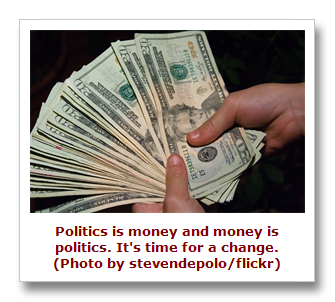Money, Money, Money, Money
The Key to the Oval Office is…Money
Ka-ching. No that isn’t only the sound of the Facebook IPO (Initial Public Offering) scheduled for tomorrow morning; it’s also the sound of the 2012 presidential campaign.
It was announced today that Mitt Romney raised $40 million in April, nearly reaching the $43.6 million collected by President Obama in the month. Whether you categorize the president’s fund raising as disappointing or Romney’s as stellar, the end result is the same: together the presidential candidates will collect enough money to make a serious dent in Obama’s celebrated Buffett Rule.
The $83 million collected by Obama and Romney is dwarfed by the money accumulated by the SuperPACs. The total dollars expended in this campaign will likely break the $3 billion dollar mark and leave chits littering the country awaiting collection this coming presidential term regardless of whomever calls the White House home.
Where does all that money go? There are four primary beneficiaries of all this money: television, radio, paid campaign staff and pollsters. Wonder what the summer replacement television shows will be this summer? How about the Romney/Obama Comedy Hour?
In America money buys access; at the rate the candidates are going it’ll be very crowded in the Oval Office this next presidential term, but you can be sure it won’t include any of the Occupy Wall Street folks; they don’t have the kind of money it takes to get in the door.
No, this isn’t an argument supporting those who would rather camp out on public property and complain about their own lack of success than work to improve their situation; far from it. It’s intended to argue against the pay-for-play corruption money brings to our political system.
Representation Ends Where Money Begins
The first step to removing the filth from our politics is to pry the money from the hands of the politicians. Donations should go into a fund managed by a private organization, where politicians would have no idea who donated the money. When politicians write checks to pay for television or radio ads it comes out of an account and when it was all spent, they’re done; might be a good lesson in money-management for the folks used to writing checks on our account.
There is no reason a national political campaign cannot be waged for $50 million dollars. If both parties were limited to $50 million dollars the voters would have to decide based on a unique concept: the issues. Campaigns would be starved of funds to launch attack ads, post up false claims and the country could actually go about choosing a candidate based on personal views and not the undue influence money brings to the table. Television, newspapers and internet sites would spread the words of the politician, so the voters would have plenty of opportunity to hear the candidate’s positions. If more than $50 million is donated, the overage could be used to cut the national debt; something the politicians don’t seem able to manage on their own.
The Supreme Court decision in Citizens United v. Federal Election Commission prevents the Federal Election Committee (FEC) from regulating spending by corporations, unions or political action committees based on freedom of speech grounds; however the decision does not prevent the FEC from regulating political campaign spending.
In 2012 both the Obama and Romney campaign have decided not to seek matching federal dollars so they can raise as much money as they can and spend it how they choose.
If you think the founding fathers could not have anticipated the effect of big-money on our republic you might wish to read James Madison’s Federalist 10 where he identified concerns that factions would overwhelm the views of the individual; today those factions are the big-money donors. Those with money get the access, their views rule and the majority is left to deal with the fall-out.
If we don’t act soon it’s only a matter of time before we’ll see trillion-dollar campaigns, the views of the electorate will be inconsequential and the vision of the nation’s founders will be little more than an asterisk in the annals of history.
While we’re at it, how about a 30 day campaign season? They can only spend so much in a month and do we need really more than a month to decide whether an opponent is better than an incumbent?


